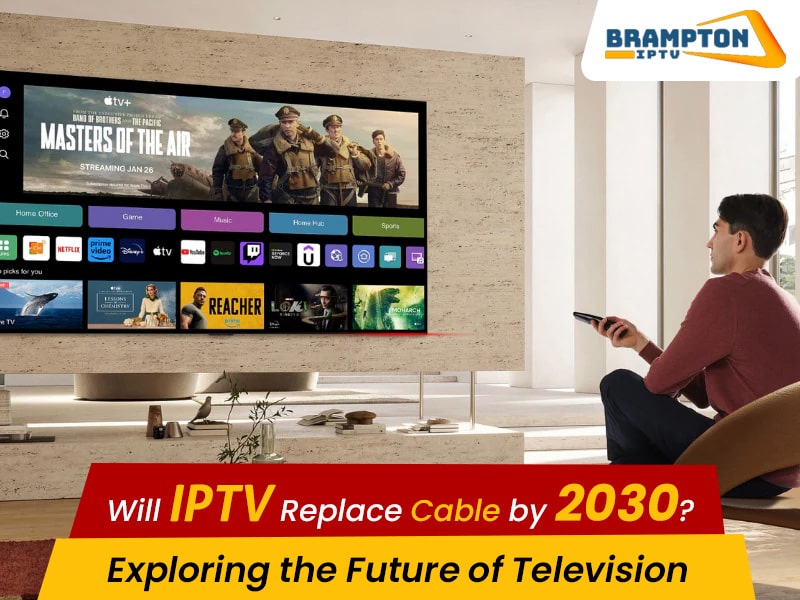
TV has changed. Streaming services now show up where cable used to rule. IPTV (Internet Protocol Television) is one of those changes. It `delivers TV using internet connections, not satellite or cable lines. So, is IPTV just another trend, or will it replace cable entirely by 2030?
IPTV works by sending shows through internet networks. It doesn’t use wires like traditional cable. A viewer can watch content when choosing, not just when it airs. This setup lets content load on demand.
Cable TV sends signals through coaxial or fiber cables. It depends on set schedules. Viewers must watch what’s airing or record it. With IPTV Replace Cable, the system connects to a server that delivers streams directly to the screen.
Also Read: Best IPTV Channel List in Canada 2025
IPTV uses the internet to stream content. Cable TV relies on hardware like set-top boxes and physical wiring. Cable has fixed channels. IPTV can offer flexible packages.
On IPTV, users can skip shows, pause live programs, and pick from large content libraries. Cable often limits those choices. Service costs also differ. IPTV usually comes with a lower price. Cable includes equipment rental and extra fees.
IPTV offers more control. IPTV viewers can choose what to watch, when to watch, and where to watch. Most IPTV services work on phones, smart TVs, or laptops. No need for heavy hardware.
Cable still delivers strong live sports and news broadcasts. It may be more stable in areas with weak internet. But it has downsides too—fewer options, higher monthly bills, and contracts that aren’t easy to cancel.
Also Read: Top 10 Misconceptions About IPTV Services In 2025
IPTV gives flexibility. The content library updates fast. Viewers can pause, rewind, or even binge-watch full seasons. That’s tough for cable to match.
IPTV often has lower prices. No equipment fees or long-term contracts. Service comes in through internet plans already in use, making it easier to set up and manage. Some providers also offer catch-up TV and cloud-based storage.
People want choices. IPTV provides those. More homes now have fast internet, which helps with better streaming. Smart TVs also support IPTV apps.
Younger viewers prefer shows online. They watch on mobile devices or smart TVs, not on traditional cable boxes. This shift in habits helps IPTV grow. Many families are cutting off cable plans to save money.
The shift toward IPTV shows in numbers. Cable subscriptions have dropped. IPTV subscribers keep growing. Some big media companies now build streaming services to keep up.
That said, cable might not vanish overnight. In areas without stable internet, cable could still be needed. Some viewers still like traditional channels. The real question is not “if” IPTV will replace cable, but “when” it becomes the main option for most households.
Cable TV might change rather than disappear. Providers could mix cable and internet streaming in one package. Live sports and news could still be cable’s strong point.
Cable may turn into a backup or niche option. But most trends suggest it’s slowly phasing out. Networks have already started focusing more on digital platforms. That says a lot about where things are headed.
Looking forward, IPTV appears to lead. It’s flexible, fast, and works with modern tech. It fits how people live today. It lets viewers skip ads, pick times, and enjoy shows in high definition.
TV won’t vanish, but how it’s delivered will. IPTV suits future needs better. With rising internet speeds and smarter tech, this system could become the new standard for entertainment by 2030.
IPTV gives more control and choice. Cable offers steady service but less flexibility. What works better depends on user needs.
It depends on internet speed. IPTV needs stable connections. In areas with weak internet, cable might still work better.
Licensed IPTV services are legal. It’s important to use verified sources, not free or pirated links.
IPTV keeps growing. Cable still holds on in some areas, but trends show change. As more homes get fast internet, Brampton IPTV could become the go-to way to watch TV by 2030. Services are getting smarter, cheaper, and more personal. That fits where technology and viewers are heading.